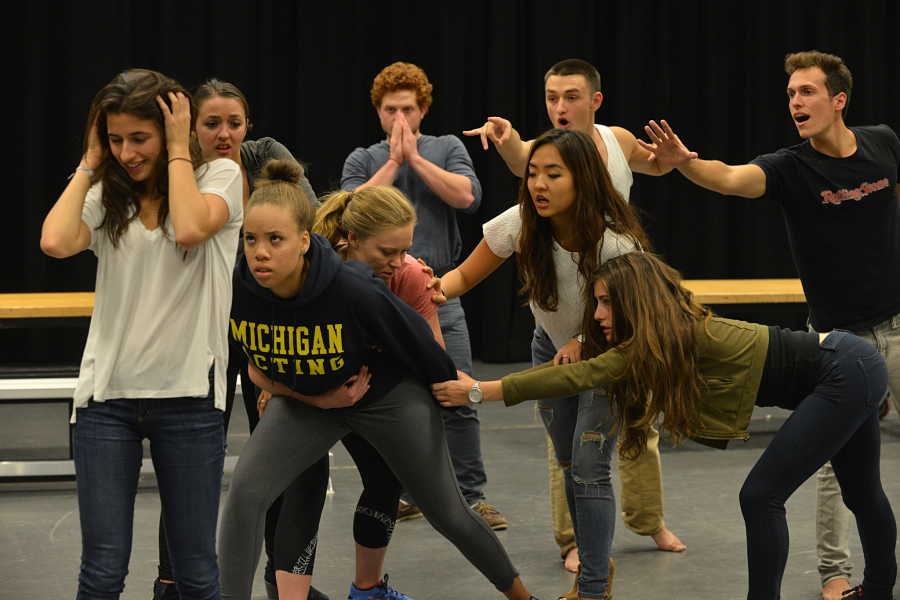On the title page for Naomi Iizuka‘s newest play Good Kids, under the “time” header, it says “Now.” Considering that the play deals with sexual assault, and the names Steubenville and Columbia University are still very much in the news, the time is very much now.
“I wanted to write a play that spoke to issues that were very important to university students right now,” says Iizuka, whose play premieres tonight at the University of Michigan as part of the Big Ten Theatre Consortium’s New Play Initiative, which will commission a female playwright each year for the next 10 years to write a play to be performed at universities. “Having taught at a number of schools as a guest artist, and now teaching at University of California–San Diego, it seems like the issue of sexual assault—and more importantly, the attitudes and misconceptions that create a climate where sexual assault is prevalent—seemed timely.”
Good Kids takes place after a high school party, when a girl, Chloe is raped by a gang of football players while passed out drunk, and the repercussions and rumors that circulate among her peers comprise most of the play. “We’re all good kids. Every single one of us,” says one of the female characters, perhaps wishfully. So what social influences can lead so many “good kids” to collectively assault a classmate, post and share the evidence on social media—not to mentioin not intervene while the act is happening?
“I think the question that the play asks is how can this happen?” Iizuka says. “If we take it as a starting point that college campuses are not filled with sociopathic predators: What is it that creates a situation where this happens?”
The play addresses a number of prevalent social issues, including the pernicious notion that the onus is on women to take preventative measures to avoid such encounters, rather than on the men who act as predators. “There’s traditionally been such uneven, inappropriate responsibility placed on young women to not dress in a certain way or to limit their alcoholic intake,” says Iizuka. “It’s very destructive.”
Iizuka had the chance to work with college students in the creation of Good Kids, and she said that conversations with them have given her hope that positive outcomes can result from candid, truthful conversations.
“It’s something that they very much want to talk about, and do something about,” she says. “There’s an enormous energy around the issue of sexual assault and what to do on campus. You don’t solve a problem like sexual assault with anything other than a deep shift in attitude, and a deep shift in attitude happens conversation by by conversation, in dorm rooms, parties and rehearsal halls.”
Good Kids kicks off the Big Ten Theatre Consortium’s New Play Initiative, designed in part to address the dearth of strong female roles available for college students by commissioning new plays from women writers (addressing another glaring disparity).
“The broader purpose was to draw attention at a national level to the fact that there are still too many roles for men, with so few roles for women, and we should do something about it,” says University of Iowa theatre department chair Alan MacVey, who brought the idea to the Consortium. “You have a lot more women in theatre than men, yet play after play has more male roles and so we are trying to change that picture.”
Each playwright receives $10,000 and development support from a number of Big 10 universities to develop her play. Each commissioned play will receive at the very least a workshop, if not a full production.
The only criterion is that the play needs to include at least seven roles for women. Considering that small-cast plays are the current preference at many not-for-profit theatres, seven roles is a relative luxury. Add to that the opportunity to have six productions slotted even before the play has premiered, and it’s a playwright’s dream.
“I fully intend to look at the script and reprocess it, which is a luxury I wouldn’t have out in the non-university world,” says Iizuka. “You can have 6 productions in a 12-month period and rewrite. That’s a huge luxury; you can keep growing with a script.”
The next playwright on tap is Kristen Greenidge, who will tackle the issue of race on campus with her play Baltimore. The consortium is still on the lookout for the next playwrights. For Iizuka, the opportunity illustrates the potential that universities offer, not only as platforms for important social conversations but also for developing new work.
“I believe universities are the great untapped resource in American theatre,” says Iizuka. “In terms of material resources: performance spaces, rehearsal rooms, shops and state-of-the-art equipment. Also, in terms of human resources and the communities you find within universities. If we want to develop artist-driven work that’s keyed into the artist’s process, that’s not a one-size-fits-all process, universities can be a big part in solving that puzzle.”
Below is a schedule of where Good Kids is playing this season:
- University of Michigan: Oct. 2–12, 2014
- Indiana University: Feb. 6–14, 2015
- University of Iowa: Feb. 8–15, 2015
- University of Wisconsin-Madison: Feb. 27–March 8, 2015
- University of Maryland: Feb. 27–March 7, 2015
- Purdue University: April 10–12, 15–18, 22–26, 2015
Readings or Workshops
- University of Illinois at Urbana-Champaign: Oct. 3, 2014
- Ohio State University: Oct. 27, 2014
- University of Minnesota: TBA


